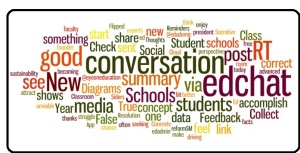Back a couple of months ago, I presented to my staff on the glories of Twitter. Some have since checked it out and have become true twitter fans, others not so much. As someone who is a self-admitted twit-a-holic (My name is Diane, a.k.a. @robertsdrb and…I tweet…a lot) I find it difficult to understand why everyone has not jumped on the Twitter shuttle to the Twitterverse of enlightenment.
So in an attempt to convince more people to join and engage with Twitter, here is a list of reasons why I get so much out of it:
- Personal Learning Network – I create my PLN by choosing who I want to follow. When someone posts something that is interesting or useful to me, I follow them. Contrarily, if they are posting things that do not serve my learning purpose, I don’t follow them. Simple. In this way, Twitter becomes differentiated professional development for each individual.
- Twitter chats – This is where connections occur and my thinking is pushed to new places with people from all over. Twitter chats such as #satchat (administrator chat on Saturday mornings) or #educoach (educational coaching chat on Wednesday evenings) connect me to people who are progressive thinkers and sharers within these domains. I can also pose a question throughout the week with these hashtags and will get a response from someone else who follows these topics.
- Learning new things – every day I come across an article, list, blog post or quote that teaches me something new. The word plethora does not begin to explain the wide variety and depth of “stuff” out there on Twitter for educators.
- Feedback – I can post a question or let people know that there is something I am searching for and someone will inevitably give me an answer. When I post to my blog, people read it and respond...this blew my mind at first and it was nerve-wracking to have others read my thoughts but now I look forward to the comments - good and not so good.
- Inspiration for blog posts – The things I read about on Twitter not only get me thinking, they inspire me to write about my thoughts on educational topics in my blog which is proving to be another way to deepen my thinking and help me reflect on my practice. By the way, I did not have a blog until after I joined Twitter and began reading all the amazing educator blogs out there which I connected to via Twitter. It was only a matter of time before I found that 140 characters are great for communicating brief thoughts on various topics but if I want to really delve into something, the blog is where I can get it all out in one place.
The more I use Twitter, the more I WANT to keep coming back…addiction? Maybe. But it is getting me connected with other educators and thinking more about my practice as a teacher and as an administrator. Other addicts go to meetings to talk about their addictions (e.g. AA), Twitter addicts just learn more, reflect more and connect more. In the words of Amy Winehouse: If they try to make me go to rehab, I won’t go, go, go.
P.S. I made the above Wordle with text from my Twitter feed.




